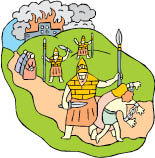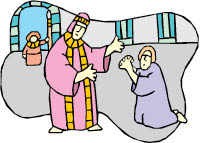
If you pay attention to what is being circulated on the web, you know
that atheists continue to attempt to make an issue of God’s supposed
brutality, savagery and abuse of mankind. One of the main issues in
their diatribes against the biblical account is that God did not
condemn slavery, and in fact even had laws about how slaves were to be
handled. Even in the New Testament there are specific mentions of
slaves and instructions to slaves that do not involve rebellion or the
abolition of slavery. Is the sanctioning of slavery by the Bible
writers another demonstration of God’s cruelty and insensitivity to the
tragedies of human existence, or is this not a valid criticism of the
Bible?
One of the things we frequently say in this journal is that when you
discuss something the Bible says, you have to look at who said it, to
whom it was said, and what the culture interpreted the teaching to mean.
Let us begin this discussion by stating clearly that slavery is wrong.
In today’s world there is no justification for any human being bound in
a forced subservient manner to someone else. Neither Jesus Christ nor
any of His 12 disciples had slaves, and in John 13:4-17 Jesus taught a
philosophy that is alien to slavery, namely that we are to be servants
of one another--all totally equal in the sight of God.
 In the Old Testament it was a different situation. It was
a very early time in man’s history--a time of war and conflict and
brute survival. Christianity did not exist, so there was no homeless
shelter or mission to run to if you were suddenly thrust out on the
street with no food or shelter. In today’s world when a war takes
place, the minute the conflict ends there are massive attempts to bring
relief to the citizens that are in the war zone--a huge percentage of
the help coming from Christian relief agencies. If you are an atheist
and “survival of the fittest” is the basis of your morality, this may
not make sense, but so far in our culture we have not quite sunk to the
level of just allowing the victims of war to die without attempting to
help them as “survival of the fittest” would suggest.
In the Old Testament it was a different situation. It was
a very early time in man’s history--a time of war and conflict and
brute survival. Christianity did not exist, so there was no homeless
shelter or mission to run to if you were suddenly thrust out on the
street with no food or shelter. In today’s world when a war takes
place, the minute the conflict ends there are massive attempts to bring
relief to the citizens that are in the war zone--a huge percentage of
the help coming from Christian relief agencies. If you are an atheist
and “survival of the fittest” is the basis of your morality, this may
not make sense, but so far in our culture we have not quite sunk to the
level of just allowing the victims of war to die without attempting to
help them as “survival of the fittest” would suggest.
In the primitive times of the Old Testament when a war was concluded
and one side had defeated the other side, what was the future for the
defeated people? Their homes were usually destroyed, their crops wiped
out, their family members and political leaders killed, and everything
taken from them. It seems obvious that the most compassionate thing for
the conquerors to do was to take the defeated people into their homes
where they would have shelter and food. The price of that shelter and
food for the time being at least was the loss of their freedom. War is
horrible, but evolutionists tell us it is a biological necessity and
that man is just fulfilling his naturally-driven impulses. Without
debating that point, it is obvious that slavery was a decent
alternative to dying by exposure and starvation. The Bible recognizes
slavery by capture in passages like Genesis 14:21; Numbers 31:9; and
Deuteronomy 20:14. What is interesting  about the biblical commands for slaves was that they
were to be respected and cared for. In Deuteronomy 21:10-14 a man’s
responsibility for a woman taken as a slave was spelled out so that he
would take her as a wife and release her if he could not sustain her in
the marriage relationship. In 2 Kings 5:2 in the famous story of Naaman
we see a slave girl who cared about her owner and wanted healing for
him, indicating something far from abuse.
about the biblical commands for slaves was that they
were to be respected and cared for. In Deuteronomy 21:10-14 a man’s
responsibility for a woman taken as a slave was spelled out so that he
would take her as a wife and release her if he could not sustain her in
the marriage relationship. In 2 Kings 5:2 in the famous story of Naaman
we see a slave girl who cared about her owner and wanted healing for
him, indicating something far from abuse.
A second way that God allowed slavery was by purchase. It is
incomprehensible for us to imagine a human being bought by another
human being, but in the stress of a primitive culture, people could not
just be turned loose to their own devices in the hope of surviving. In
Genesis 17 we see the ritual of circumcision was extended to slaves,
and we see Joseph being sold to merchants in Genesis 37:36 and 39:1,
something referred to in a very negative way throughout the Bible. What
is again interesting is that when you read Leviticus 25:44ff you see
the rules for selling slaves, but you also see restrictions on how they
were to be treated. In fact, verse 53 states “you must see to it that
his owner does not rule over him ruthlessly.” There were even rules
about the release of slaves that had special significance to the
history of Israel, and a caring attitude about the well-being of other
humans.
A third way that a person could be taken into slavery was as a
restitution for a crime. In Exodus 22:3 a thief could pay for his crime
by being sold. A person could also become a slave as a means of paying
off debts (Exodus 21:2-6 and 7-11; Deuteronomy 15:12-18). A person
could even sell himself for security (see Leviticus 25:39-43) but even
in this case there was a formula for his release.
Jesus comes to this ancient, primitive world with a whole new concept
of life. The Sermon on the Mount is one of the most beautiful passages
in all of literature. Over and over Jesus says “You have heard that it
was said, ... but I tell you ...” (NIV). Jesus dealt with attitudes and
values that were alien to what people had been living with. Jesus gave
a way of life that would ultimately eliminate slavery  of
all kinds, because Jesus taught the equality of men
and women in all aspects of life. In spite of this emphasis, Jesus does
not attempt to overturn the political structures of the day. Rome was a
brutal, violent, chauvinistic, abusive, political state. Jesus lived
within that political system without trying to over-power it by force.
The United States has had a hard time realizing that what works among
our people does not necessarily work among the people of the Middle
East or Africa.
of
all kinds, because Jesus taught the equality of men
and women in all aspects of life. In spite of this emphasis, Jesus does
not attempt to overturn the political structures of the day. Rome was a
brutal, violent, chauvinistic, abusive, political state. Jesus lived
within that political system without trying to over-power it by force.
The United States has had a hard time realizing that what works among
our people does not necessarily work among the people of the Middle
East or Africa.
What Jesus does is to teach His followers to function within the
system. In Ephesians 6:5-9 the inspired writer addresses slaves and
masters and does not command them to upset their secular relationship.
He rather calls them to serve as if they are serving God because God
looks at slaves and masters equally. Colossians 3:22-4:1 presents the
same teaching. In Philemon we have Paul’s wonderful words to his friend
Philemon about a runaway slave named Onesimus. The most wonderful
verses in this passage are verses 15-16 where Paul says “Perhaps the
reason he was separated from you for a little while was that you might
have him back for good--no longer as a slave, but better than a slave,
as a dear brother. He is very dear to me but even dearer to you, both
as a man and as a brother in the Lord.”
First Corinthians 7:21-24 and Galatians 3:26-29 clearly show the
Christian response to the issue of slavery. In God’s sight we are all
equals. Slavery is wrong and should not be practiced by Christians. In
a world dominated by philosophies and religions that embrace slavery as
a scientific, political, and religious ideology, Jesus calls us to
preach a gospel of peace, equality, and love, and to refrain from
violence. Expecting Jesus to openly declare a physical war to abolish a
human institution, even one as horrible as slavery, is to badly
misunderstand what Jesus taught, and to be ignorant of the Christian
system.
Back to Contents
Does God Exist?, SepOct09.


 In the Old Testament it was a different situation. It was
a very early time in man’s history--a time of war and conflict and
brute survival. Christianity did not exist, so there was no homeless
shelter or mission to run to if you were suddenly thrust out on the
street with no food or shelter. In today’s world when a war takes
place, the minute the conflict ends there are massive attempts to bring
relief to the citizens that are in the war zone--a huge percentage of
the help coming from Christian relief agencies. If you are an atheist
and “survival of the fittest” is the basis of your morality, this may
not make sense, but so far in our culture we have not quite sunk to the
level of just allowing the victims of war to die without attempting to
help them as “survival of the fittest” would suggest.
In the Old Testament it was a different situation. It was
a very early time in man’s history--a time of war and conflict and
brute survival. Christianity did not exist, so there was no homeless
shelter or mission to run to if you were suddenly thrust out on the
street with no food or shelter. In today’s world when a war takes
place, the minute the conflict ends there are massive attempts to bring
relief to the citizens that are in the war zone--a huge percentage of
the help coming from Christian relief agencies. If you are an atheist
and “survival of the fittest” is the basis of your morality, this may
not make sense, but so far in our culture we have not quite sunk to the
level of just allowing the victims of war to die without attempting to
help them as “survival of the fittest” would suggest. about the biblical commands for slaves was that they
were to be respected and cared for. In Deuteronomy 21:10-14 a man’s
responsibility for a woman taken as a slave was spelled out so that he
would take her as a wife and release her if he could not sustain her in
the marriage relationship. In 2 Kings 5:2 in the famous story of Naaman
we see a slave girl who cared about her owner and wanted healing for
him, indicating something far from abuse.
about the biblical commands for slaves was that they
were to be respected and cared for. In Deuteronomy 21:10-14 a man’s
responsibility for a woman taken as a slave was spelled out so that he
would take her as a wife and release her if he could not sustain her in
the marriage relationship. In 2 Kings 5:2 in the famous story of Naaman
we see a slave girl who cared about her owner and wanted healing for
him, indicating something far from abuse. of
all kinds, because Jesus taught the equality of men
and women in all aspects of life. In spite of this emphasis, Jesus does
not attempt to overturn the political structures of the day. Rome was a
brutal, violent, chauvinistic, abusive, political state. Jesus lived
within that political system without trying to over-power it by force.
The United States has had a hard time realizing that what works among
our people does not necessarily work among the people of the Middle
East or Africa.
of
all kinds, because Jesus taught the equality of men
and women in all aspects of life. In spite of this emphasis, Jesus does
not attempt to overturn the political structures of the day. Rome was a
brutal, violent, chauvinistic, abusive, political state. Jesus lived
within that political system without trying to over-power it by force.
The United States has had a hard time realizing that what works among
our people does not necessarily work among the people of the Middle
East or Africa.